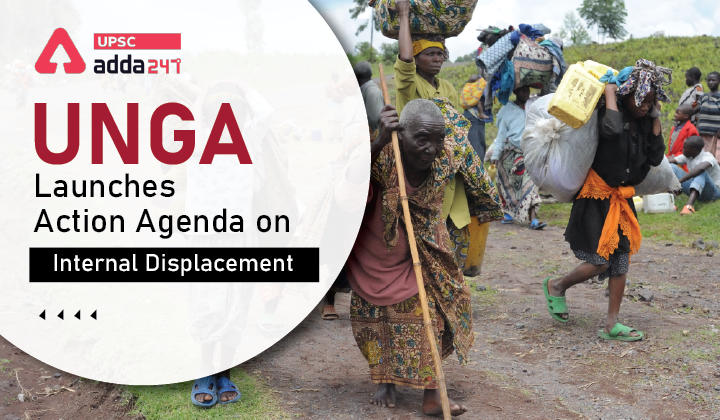Table of Contents
Internal displacement in world: Relevance
- GS 2: Bilateral, regional and global groupings and agreements involving India and/or affecting India’s interests.
Internal displacement: Context
- Recently, United Nations General Assembly (UNGA) has launched the Action Agenda on Internal Displacement to better resolve, prevent and address internal displacement crises.
Action Agenda on Internal Displacement: Key points
- The Action Agenda sets out 31 commitments by the UN system and includes calls to member states, international financial institutions, the private sector and other actors.
- Internal migration requires an integrated approach combining development, peace building, human rights, climate action and disaster risk reduction efforts.
Action Agenda on Internal Displacement: Why needed?
- With conflicts and disasters increasing, the number of IDPs (Internally Displaced Persons) have more than doubled over the last 10 years, with women, children and marginalised groups often facing the greatest impacts.
- According to a World Bank report, more than 200 million people could be forced to move internally by 2050 in just six regions due to climate change if immediate action is not taken.
- Russian Ukraine war has driven 13 million people out of their homes and communities, nearly two-thirds of whom remain in Ukraine.
- The plight of this increasingly vulnerable group of people has become more than a humanitarian issue.
https://www.adda247.com/upsc-exam/unga-agenda-on-internal-displacement/
Action Agenda on Internal Displacement: The agenda goals
The Action Agenda on Internal Displacement has broadly three goals. The below given three goals are interlinked and no solution can be effective if any of them is looming.
- To help internally displaced persons find durable solutions
- To better prevent future displacement crises
- To ensure stronger protection and assistance for those currently facing displacement.
Action Agenda on Internal Displacement: Recommendations
- The first goal can only be achieved if the rights and agency of IDPs of all ages, genders and diversities are recognised.
- IDPs should be given right to choose what is best for them and should be allowed to participate in decisions that would affect them.
- The primary responsibility of facilitating sustainable solutions to suitable displacement rested with states.
- Greater action is needed from and support to local and city authorities because IDPs are increasingly settling and residing in urban areas worldwide.
- To prevent future crises, mobilise rapid action to support de-escalation, political negotiation and conflict resolution when there are early signs of conflict, renewed violence or threats to civilians.
Internal displacement meaning
- Internal displacement refers to forced movement of people within the country they live in.
- As of the end of 2019, 50.8 million people were living in internal displacement because of conflict, violence and disasters.
Internal displacement in India
- According to Internal Displacement Monitoring Centre 2021, India witnessed around 5 million internal displacements last year.
- India ranked third in terms of most internal displacements due to disasters after China and the Philippines.
- IDP instances in India
- Adivasis, who bore the brunt of major developmental projects such as big dams
- Coastline dwellers such as those in Satabhaya in Odisha, where seven villages were being swallowed by the sea
- Thousands of tribals in Chhattisgarh who had been forced to migrate to Khammam in Telangana due to the conflict between Maoists and the Salwa Judum.
- India has a policy in place for dam-displaced people. But it does not have one for those displaced by political conflict or environmental reasons.
Read current affairs for UPSC





 TSPSC Group 1 Question Paper 2024, Downl...
TSPSC Group 1 Question Paper 2024, Downl...
 TSPSC Group 1 Answer key 2024 Out, Downl...
TSPSC Group 1 Answer key 2024 Out, Downl...
 UPSC Prelims 2024 Question Paper, Downlo...
UPSC Prelims 2024 Question Paper, Downlo...
